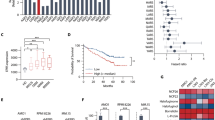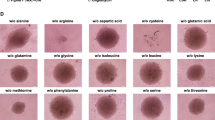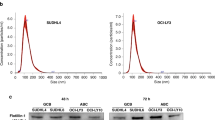Abstract
Analysis of rat, pre-T cell ‘Nb2 lymphoma’ sublines, manifesting different degrees of malignant progression, can indicate phenotypic changes potentially useful as therapeutic targets. In this study, the prolactin (cytokine)-dependent Nb2-11 and autonomous Nb2-SFJCD1 sublines were compared for in vitro thiol growth requirements. Whereas Nb2-11 culture growth depended on 2-mercaptoethanol (2-ME; 33–100 μ M), Nb2-SFJCD1 cells were 2-ME-independent. This difference stemmed from differential uptake of exogenous L-cystine, critically required for proliferation. Uptake of 35S-L-cystine (10 μ Ci/ml; 40 μ M) showed Nb2-11 cells had low cystine uptake capability; 2-ME enhanced cystine uptake to growth-sustaining levels. Nb2-SFJCD1 cells did not require 2-ME due to intrinsic, 11-fold higher cystine uptake via the xc- cystine/glutamate transport system. In absence of 2-ME, monosodium glutamate abrogated Nb2-SFJCD1 proliferation by specifically inhibiting cystine uptake (85% at 10 m M). Elevated glutathione (GSH) levels were not essential for growth of either line as shown with L -buthionine-(S,R)-sulfoximine (0.1–4 m M) treatment. The cyst(e)ine requirement therefore did not primarily involve maintenance of normal GSH levels, reported critical for T lymphocyte replication. These and other results suggest increased cystine uptake capability constitutes another potential step in progression of T cell cancers which is not coupled to cytokine autonomy or metastatic ability development. The xc- transport system apparently provides a novel target for T cell cancer therapy. Its inhibition would suppress cystine uptake by certain progressed cells, and also interfere with cystine uptake, and subsequent cysteine release, by eg macrophages, thought to have a role in cysteine delivery to lymphoid cells.
This is a preview of subscription content, access via your institution
Access options
Subscribe to this journal
Receive 12 print issues and online access
$259.00 per year
only $21.58 per issue
Buy this article
- Purchase on Springer Link
- Instant access to full article PDF
Prices may be subject to local taxes which are calculated during checkout
Similar content being viewed by others
Author information
Authors and Affiliations
Rights and permissions
About this article
Cite this article
Gout, P., Kang, Y., Buckley, D. et al. Increased cystine uptake capability associated with malignant progression of Nb2 lymphoma cells. Leukemia 11, 1329–1337 (1997). https://doi.org/10.1038/sj.leu.2400739
Received:
Accepted:
Issue Date:
DOI: https://doi.org/10.1038/sj.leu.2400739
Keywords
This article is cited by
-
mTOR-dependent upregulation of xCT blocks melanin synthesis and promotes tumorigenesis
Cell Death & Differentiation (2019)
-
Emerging role of lipid metabolism alterations in Cancer stem cells
Journal of Experimental & Clinical Cancer Research (2018)
-
The ferroptosis inducer erastin irreversibly inhibits system xc− and synergizes with cisplatin to increase cisplatin’s cytotoxicity in cancer cells
Scientific Reports (2018)
-
Cytotoxic activity of selenosulfate versus selenite in tumor cells depends on cell line and presence of amino acids
Environmental Science and Pollution Research (2016)
-
Urine metabolite profiling offers potential early diagnosis of oral cancer
Metabolomics (2012)



